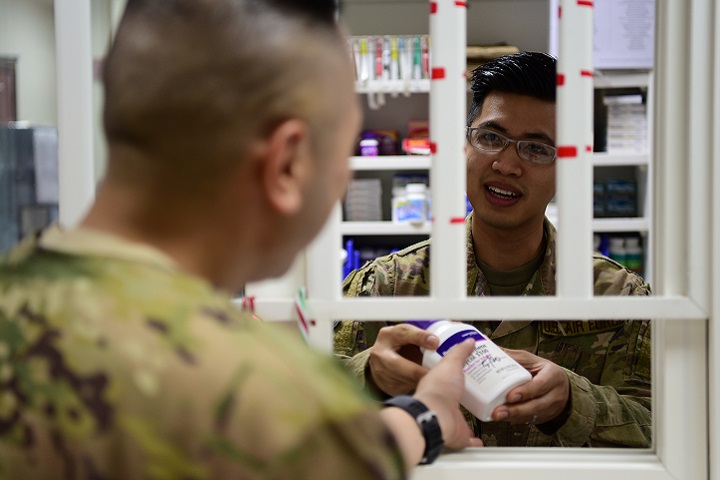
Airman's lifesaving act leads to physician assistant career

Air Force Tech. Sgt. Julian Tayag, the noncommissioned officer-in-charge of the 386th Expeditionary Medical Group pharmacy, provides medication to a coworker at an undisclosed location in Southwest Asia, recently. In early May, Tayag was selected to attend the Interservice Physician Assistant Program. (Air Force photo by Staff Sgt. Christopher Stoltz)
SOUTHWEST ASIA — Three years ago, Air Force Tech. Sgt. Julian Tayag was closing the pharmacy for the duty day with his wingman when tragedy nearly struck. Three years later, this event would culminate in his acceptance into the Interservice Physician Assistant Program.
“My wingman and I were just about to lock the doors for the day when we noticed a man exhibiting strange signs,” said Tayag, the noncommissioned officer-in-charge of the 386th Expeditionary Medical Group pharmacy. “We approached him and asked him if he needed assistance to his car.”
Little did Tayag know, the man would need more than help to his car. Before the man could answer, he collapsed -- falling lifelessly to the ground. The two airmen immediately searched for the man’s pulse, but had no success. Tayag immediately began CPR and instructed his wingman to call for emergency transport.
Fortunately, he was able to resuscitate the patient and keep the situation under control until paramedics arrived.
‘A Sign’
“Although I serve in a medical capacity, I have always wanted to pursue a career in higher levels of healthcare,” Tayag said. “That event left me feeling deeply rewarded and only furthered this desire. It is probably the catalyst of why I pushed myself to apply for IPAP. I took it as a sign.”
The program, which was created as a joint effort in 1996 by the Air Force, Army and Navy, serves as a bridge for service members to attend school with the end goal of becoming physician assistants, medical professionals who are nationally certified and state licensed to practice medicine with the supervision of a physician.
Based at Joint Base San Antonio-Fort Sam Houston's U.S. Army Medical Department Center and School, IPAP consists primarily of enlisted active-duty members who, upon graduation, are commissioned as first lieutenants into the officer corps of their respective service.
Studies
Tayag will enter the classroom and begin Phase One of IPAP. This phase includes a rigorous curriculum of 40 courses and 101 semester hours to be completed in just 16 months. He must complete courses in biochemistry, microbiology, orthopedics, rheumatology and dermatology.
Upon completion of Phase One, Tayag will receive a bachelor’s degree, and will immediately move to a master’s-level curriculum, which will culminate during Phase Two. During this phase, which spans 13 months, he will be assigned to an Air Force or Army hospital to gain specialized knowledge and experience during a series of clinical rotations.
While the act of saving a man’s life helped shape and fuel his vision of becoming a physician assistant, Tayag said his vision would have remained just that if not for a little bit of help.
“I have some amazing people in my life who helped me get selected,” he said. “I want to thank God, my beautiful wife, my family and supervisors, mentors, civilian instructors, professors, leadership, peers and coworkers who always pushed me forward. They helped me overcome my failures and only served to aid in my successes. My achievements are only possible because of them.”
Disclaimer: Re-published content may have been edited for length and clarity. Read original post.































No hay comentarios:
Publicar un comentario